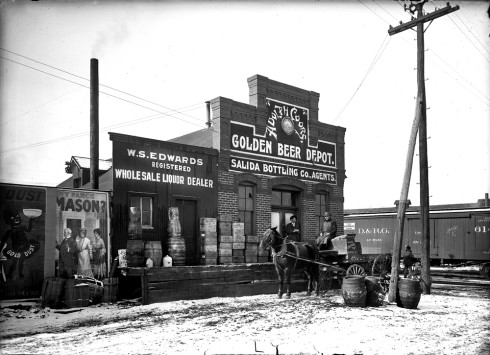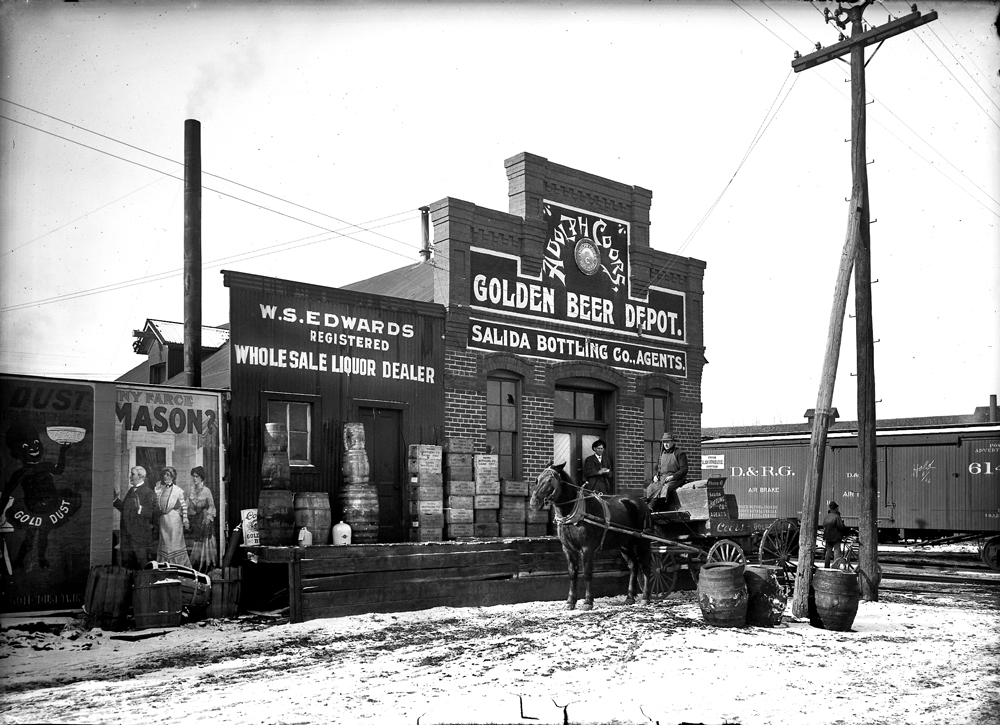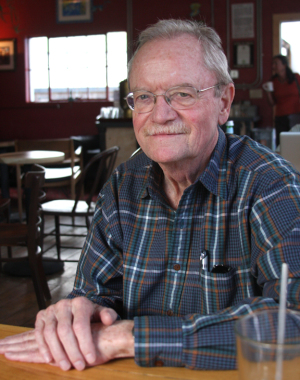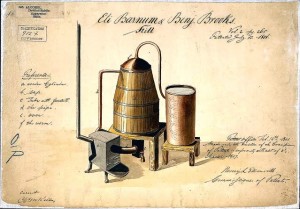Colorado has a long history of commercial beer breweries. The Coors Brewing Company, first established in 1873 by German immigrants Adolph Coors and Jacob Schueler in Golden, is still in operation and is the largest single beer-brewing facility in the world. Other large Colorado breweries, such as the Walter’s Brewing Company and the P.H. Zang Brewing Company, have long since disappeared, leaving only historic mementos to indicate their existence. Back in the boom days of mining and railroads, it wasn’t unusual for even the smallest town to have at least one commercial brewery. At one time, Leadville boasted at least eleven breweries. Villa Grove, Bonanza, Silver Cliff, Westcliffe, Rosita, even Granite, all had small breweries back in the day, but the mining busts, plus the onset of statewide prohibition in 1915, spelled doom for these small brewing operations.

Then came the magic year of A.D. 1979 and the advent of the Boulder Brewing Company (now the Boulder Beer Company), the first modern microbrewery in the state, signaling the beginning of a boom in small craft breweries around Colorado, a boom which continues to this day. Currently there are more than 140 microbreweries in Colorado. As of 2010, we rank third in the country in the number of brewpubs and craft breweries, first in the nation in gross beer production, and fourth in the number of breweries per capita, according to The Brewers Association and The Beer Institute. Colorado is also home to four of the top 50 brewing companies in the nation.
We decided to take a look at the advent of modern microbreweries in Central Colorado, with a little historical perspective since, it appears, John Barleycorn is obviously the preferred beverage of many Colorado adults.
San Luis Valley
William Bingel’s Saguache Brewery lasted less than a year, opening in 1885 and closing the following year. Bingel also ran a brewery in Alamosa from 1879 to 1892, and in Del Norte from 1873 through at least 1891. There was also a Bingel Brewery in Colorado City (near Colorado Springs) in 1879. The brewery in Del Norte ended tragically with a large explosion, killing both father and son brewers, effectively ending the brewery. Old glass bottles can still be seen up along San Francisco Creek in Del Norte where the brewery once stood.
Three Barrel Brewing
The first modern-day brewery to begin commercial fermentation in the San Luis Valley was the Three Barrel Brewing Company, which began in late 2005 under the names Three Barrel Brewing Company and Bricker Beer. John Bricker and his son-in-law William Kreutzer are the primary owners, with Bricker as the head brewer and Will the “barrel monkey” (manager, to be official).
After having little success in the art of home winemaking, Bricker took up home brewing, and his efforts were met with praise from many of his friends and family. From a 15-gallon, half-barrel system in his garage, John was encouraged to go big, so he bought a building in Del Norte and moved his insurance business there from Monte Vista. He then traveled to California to purchase a three bbl brewing system from a failed microbrewery. He was able to pick up for a bargain a system consisting of a mash tun, boil kettle, heat exchanger and pumps, and four copper-sided fermenters. He put the brewery in the back of the insurance office, where for years it was a quirky little brewery allowing John to work his insurance office while creating brews out back.
In early 2012, the decision was made to move the insurance office next door and open a small tasting room featuring 12 beers on tap, a handful of Belgian Sour beers, and wood-fired pizzas, calzones, strombollis, lasagna and breadsticks. The tasting room officially opened in August of 2012.
Kreutzer grew up in Golden, Colorado, in the shadow of the Coors Brewing Company. After working in banking for several years, he broke away from “corporate America,” built two businesses of his own and met his wife, Bridget Kreutzer, John’s daughter. After dabbling in home brewing himself and with John’s encouragement, the collective decision was made in 2011 to uproot their family from Littleton and move to Del Norte to help get the tasting room going and begin bottling and distribution.
Three Barrel specializes in small batches of solid craft ales, lagers and aged Belgian Sour beers. They rotate three to five seasonal beers per season in addition to their seven core beers: Trashy Blonde Blonde Ale, Bad Phil Pale Ale, Hop Trash IPA, Pemba Sherpa Belgian Saison, Burnt Toast-Brown Ale, Black Yak-Black Lager and Black Copter Export Stout. Additionally they’ve become known for their limited release, aged Belgian Sour beers from their Penitente Canyon Ales collection.
For their beers, they use some local hops from La Jara, the San Luis Valley, Niwot and Palisade. Most of their malts come from the Colorado Malting Company near Alamosa, their honey from and Haefeli’s Honey from Del Norte. Currently they distribute on draft and in 22-ounce bottles to Del Norte, Monte Vista, Alamosa, South Fork, Pagosa Springs and Salida. Their sour beer is a base beer taken from primary fermentation and pulled off into a secondary fermentation where souring yeasts – “bugs” – are introduced. Secondary ingredients such as wood, spices and honey, are also introduced then aged for six months to two years depending on the beer. These beers are still carbonated but are best served at room temperature and feature an explosion of flavor characteristics such as tart, spicy, sour, sweet and fruity.
The company is very focused on using local and Colorado ingredients in their beers and in the foods in the tasting room, such as Gosar Sausage from Monte Vista. The brewery is in the process of expanding distribution (including sour ales in 375ml bottles) to Denver and Durango because of increased bottling capabilities with a bottling line and storage space with a new warehouse. They’d like to continue catering to the Colorado market while keeping their batches small, high-quality and quirky. They probably also hope to never share the fate of their predecessor brewery in Del Norte. – By Mike Rosso
San Luis Valley Brewing Company
The first beer brewery in Alamosa was the San Luis Valley Brewing Company (SLVBC), which began serving suds in March 2006. Scott and Angie Graber started the business and continue to run it today. Both arrived in the Valley in 2000 as Americorps volunteers with a love for the outdoors … and beer. Scott has a master’s degree in theology from Notre Dame and Angie studied bacteriology at the University of Wisconsin. Shorting after getting married in 2002, they began brewing beer at home, a hobby they claimed “got out of hand.”
In 2005 Angie’s parents, Steve and Sue Friedman, moved to Alamosa to help get the brewery and restaurant off the ground. In 2006 the brewery produced 280 bbl and this year are on track to produce 800 bbl. They produce six beers year-round, including their Valle Caliente Green Chili Lager. They also reserve four taps for their own seasonal brews which are released monthly, and four taps for ‘guest brews’ from other Colorado brewers. The majority of their outside distribution is within the San Luis Valley and south central Colorado. They recently partnered with the Royal Gorge Route Railroad to create for them a signature beer: Royal Gorge Route Red. Distribution is expanding this summer to include Salida, Cañon City, and Pueblo.
This year the SLVBC is adding a commercial coffee roasting operation, as well as 30 bbl of added fermentation and brite beer storage capacity. That expansion will include an automated bottling line and additional cold storage for doing oak- and wine-barrel aged beers. Their kitchen offers locally focused foods, and the couple recently invested in a 9.2 kilowatt photovoltaic solar array for electricity. As the first modern commercial brewery in Alamosa, many local folks were excited when they announced plans to begin brewing operations. Others thought they were off thier rockers, according to Scott. Just ask their many loyal customers and thirty employees how that all worked out. – By Mike Rosso
Leadville
Two Mile Brewing Company
Sean Terrill is trying to add to Leadville’s rich brewing history with plans to open a brewpub in downtown Leadville this June. During the height of boom days, Leadville had 113 saloons and 11 breweries, including the Columbine Brewery, which around 1900, outsold Coors. Among the others were the Gaw Brewery in California Gulch and the Stockbridge and Elwell Breweries north of town. Another, Mack’s Brewery burned down in 1892. In recent years brewpubs have come and gone quickly in Leadville. Two Mile Brewery hopes to change that trend. Terrill, working with six silent partners, plans to open the restaurant in June and begin brewing in August, once the federal brewer’s notice is complete. Two Mile will begin brewing a Vienna Lager and a Belgian Blonde as soon as possible. Terrill’s goal is to distribute outside of Leadville within two years. – By Tyler Grimes
Gunnison
Gunnison Brewery
The “new” Gunnison Brewery is celebrating its 10th anniversary this year. It was started in 2003 by Kevin and Lori Alexander, who still own it today. Kevin is a full-time biology professor at Western State Colorado University, and Lori runs the business. They brew on a 2.5 bbl Specific Mechanical system made up of a tun, kettle, four open fermenters and serving tanks; they offer over 20 different beers they’ve been brewing over the past 10 years. Whenever possible they try to use local ingredients. The brewery produces a West Slope series of beers during the fall, featuring beers made with ingredients sourced within a 100-mile radius of the brewery. In 2007, the Gunnison Brewery won a gold medal at the Great American Beer Festival for their Summertime 69 (herb and spice category).
The current brewer is Kevin Doherty, a Chemistry student at Western State Colorado University, who just began at the brewery in October. The brewpub also offers salads, burgers, wraps, pub grub and other foods to wash down with a pint of their Harmless Hare (10.5% alcohol). – By Mike Rosso
Buena Vista
Eddyline Restaurant and Brewing Company
Attendees of FIBArk will notice a change in sponsorship this year. There won’t be bicycle logos adorning a New Belgium tent – instead the kegs will be coming from just up the road. Eddyline Brewery of Buena Vista has taken title sponsorship of both Paddlefest in BV and FIBArk in Salida. “They (FIBArk organizers) asked if we would be able to handle that kind of volume,” said Ryan McFadden, partner and manager at Eddyline, “but that’s only a couple days production for us.”
With a recent expansion, Eddyline moved its brewing from the restaurant to a new brewery and taphouse. “We tripled production last year, and we’re on pace to double again this year,” said McFadden. The pub was bought with room to grow, and McFadden says they hope to begin adding to the building by the end of the year to meet a continually rising demand.
Buena Vista’s first brewery began in Socorro, New Mexico, under the same ownership: McFadden, Mic Heynekamp, Molley Heynekamp and Brian England. The restaurant and brewery expanded to BV, without large-scale brewing in mind. Water quality issues in Socorro led to moving the brewing operation to Buena Vista.
Currently, Eddyline has a range of seasonals on tap. “We have 12 beers and only 10 taps,” said McFadden, laughing. The brewery is the only one in the state to sell 16-ounce six-packs, including their newest, River Runners Pale Ale, a brew that won gold last fall at the Great American Beer Festival. – By Tyler Grimes
Salida
Amicas
Salida’s first brewery, Munn & Munn, was short-lived. It opened and closed its doors in the same year, 1893. It wasn’t until 100 years later, 1994 to be exact, that some entrepreneurs thought it might be a good idea to open a restaurant in Salida that also offered locally made brews.
Tom Hennessy has been in the restaurant business since the age of 15 and had opened four restaurants and a coffeehouse before moving to Salida in 1994 with his wife, Sandy. He already had a successful restaurant in Albuquerque, Il Vicino, which served brick-oven pizzas, salads and their own microbrews. Tom decided to try the same approach in Salida. First they purchased a building on East Second Street. which had once been a mortuary. It was the only building for sale downtown at the time, according to Hennessy. Il Vicino opened its doors in Salida in 1994 to excitement from some locals; but others “did not know what to make of it,” said Hennessy.
They began with six to eight beers on tap and eventually began bottling an IPA (India Pale Ale) called Wet Mountain IPA, and distributed that around Colorado and New Mexico. Their first beer though was Loyal Duke, because Hennessy loved the story of the railroader’s dog, Duke. He added Loyal because it “sounded nice.” They also brewed up a Ute Trail Pale Ale, Tenderfoot Brown Ale and Pig Tail Blonde Ale (Sandy always wore her hair in pigtails). Hennessy designed the brewing system, developed the original recipes and was the sole brewer. Eventually additional brewers were brought on including Hennessy’s good friend Tom Jacobson, who worked as a brewer for a year. Hennessy also made a film of the installation and startup of the Salida brewery that he called “Frankenbrew,” which is currently posted on YouTube. He is also the author of “The Brewery Operations Manual,” and currently runs the Colorado Boy Brewing Company in Ridgeway, Colorado.
Il Vicino, which currently has eleven restaurants in three states, operated in Salida until 2002 until it was sold to Salida resident Kathie Younghans. She changed the name to Amicas Pizza and Microbrewery and kept many of the same dishes, including the popular brick-oven pizza. She also maintained the brewing operation and hired Mike LaCroix as her brewmaster.
Mike LaCroix is still head brewer and plant manager at Amicas today and has an impressive resume. His brewing career began in 1995 at the Tommyknocker Brewery in Idaho Springs. From there it was on to brewing school in Denver and then to Tucson, Arizona where he was employed to assist with the startup of a brewery at a resort. He also worked for a popular college pub in Tucson called Gentle Bens. LaCroix then moved to Michigan, where he helped start several breweries on Lake Michigan. He eventually went back to work for Tommyknocker, helping them to start up a large brewery in Phoenix. It was then back to Colorado where he worked at the Golden City Brewery for two years before relocating to Salida to work for Amicas.
At Amicas, he picked up where Tom Hennessy left off and maintained the framework of what was already in place. That framework consisted of brewing beers that are strong representations of each style of beer. He is constantly adapting his styles for the emerging palate of the consumer: “Our recipes are always evolving, as are we,” he said. The brewery operates on a seven-barrel system, producing about 500 bbl a year. The beer is sold at the restaurant as well as in other bars, taverns and restaurants in Salida. The product is also distributed in Summit County, the Vail Valley and other parts of Chaffee County. They even have several liquor store owners who purchase Amicas 22-ounce “bombers” for resale in stores in Fort Collins, Durango and the emerging community of Reunion, out by Denver International Airport.
They’ve entered their beer in national competitions such as the Colorado State Fair and the Great American Beer Festival in Denver, where they won a bronze medal in 2011 for their Ute Trail Pale Ale out of a field of 105 beers. LaCroix kept many of the original product names but changed the recipes and they have added popular beverages such as their Green Chile Ale (flavored with Anaheim and Serrano peppers), a Double IPA, and a Raspberry Porter. All in all they produce about 24 different styles of beer per year. They always maintain seven on tap along with a homemade root beer, all of which remain big favorites of the local connoisseurs of malted beverages. – By Mike Rosso
Moonlight Pizza & Brewpub
Moonlight Pizza began operating in the early 1990s and added brewing to the restaurant in late 2011. Moonlight’s partners are Kim and Scott Bouldin, Kyle Buskist, Bryan Ward and Brenna Eaker. Currently, Moonlight does not bottle or distribute but does fill growlers and sell kegs, along with meeting in-house needs. On tap now at Moonlight: Cream Ale, Amber, IPA, Extra Pale Ale, Stout and an Old Ale. Scott Bouldin, head brewer, said they’ll be making an Extra Special Bitter soon. – By Tyler Grimes
Elevation Beer Company
Three years ago at a barbecue in Boulder, Sheila Bustamante, Xandy Bustamante, Christian Koch and Carlin Walsh all met together for the first time. They sampled one of Koch’s homebrews, a porter called Little Mo’, named after a run at Monarch. Some scheming ensued, and in short, Elevation Brewing Company was born, at least conceptually. “It took a year to draw up business plans and another to find the space and move in,” said Sheila Bustamante, a graduate – along with Koch – of Buena Vista High School. The four partners mentioned are the sole owners of Elevation Beer Company, and one silent partner helped launched the brewery. Last May, Elevation opened as the largest new brewery in Colorado, out of 40 new breweries.
With nearly one year in business behind them, the future is looking bright at Elevation. Last year they brewed 935 barrels; that’s increasing to about 3,000 this year. A new canner is pushing out bottles ten times faster, and they hope to begin statewide distrubution. Elevation was built with room to grow, with multiple 1,000 and 2,000 gallon fermentors. How much beer is that in individual consumer terms? “You would have to drink nine pints a day for three years to empty the 1,000-gallon tank,” said Xandy Bustamante, distribution manager.
Elevation, located near the fairgrounds in Poncha Springs, will begin daily tours of the brewery starting this summer. The on-location tap room has eight different rotating beers.
Koch, head brewer, who learned to brew at Tommyknocker Brewery, rates his creation like ski runs. The Kolsch is the only green, a few blues stay on tap, the black series are the seasonals (including the current, Third Base), and the double black series are aged in bourbon barrels. To celebrate one year in business, Elevation will be releasing 7347, a double IPA named after the brewery’s elevation. Also upcoming, in collaboration with other Ark Valley Libation Society breweries, Moonlight and Amicas, Elevation will contribute to Brown’s Canyon, a Belgian Brown Ale honoring the proposed wilderness designation. g– By Tyler Grimes




